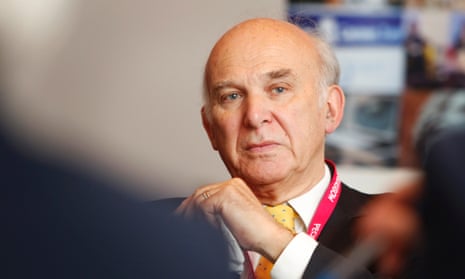Vince Cable was clear, dismissive and forthright: the immigration policies being pursued by the government, of which he is a prominent member, are “stupid” and “ludicrous”.
The business secretary has never been one to stay silent on policies that he believes are wrong – even if they are the policies of the government he represents.
So it proved at a roundtable event at the Liberal Democrat annual conference in Glasgow earlier this month, sponsored by the British Academy.
Cable used the Guardian-hosted event, which looked at the issues surrounding immigration, to tear into policies which, he claimed, had been imposed on his government by his Conservative coalition partners.
The business secretary derided the government’s immigration target as “basically very stupid”, warning that it was meaningless, impossible to enforce and “ludicrous”. Theresa May, Conservative home secretary, wants to keep the net number of migrants coming to the UK to 100,000 or fewer. However, ever since the coalition government took office four and a half years ago, this target has proved impossible to keep and May admitted earlier this year that it was proving harder and harder to aim for.
Coalition tensions over the issue have bubbled to the surface before and the business secretary showed at this key event at his own party conference that he is prepared to keep on fighting to prove that the Tory target is both unachievable and wrong.
Cable said the target was wrong because ministers had no control over it. He pointed out that net immigration was rising because fewer people were emigrating and because of the free movement of people across the EU.
“And unless we join Ukip there’s nothing we can do about,” he said.
Cable dismissed the immigration target as “unobtainable and largely meaningless” and warned that all it was doing was restricting the number of foreign students coming to the UK and those on skilled work permits, which was damaging business.
“We have got a policy which is basically stupid, basically very stupid,” he declared.
The business secretary was aware that his decision to speak up in favour of a liberal immigration policy would attract derision from the rightwing press and some politicians. And he said that it would help if the Liberal Democrat party could persuade employers and mainstream Conservative politicians to support a positive immigration policy on the basis that it would help the economy.
But he warned that it would be difficult to make the case in the face of the widespread – and misguided – public view that immigration was causing major economic problems.
“Next to the economy, everything tells us that this is the issue people care most about,” said Cable. “There are points to be scored and votes to be won so people will use it, and there is no point being under any illusions about that.
“There is absolutely no merit in us pandering to it, we are struggling anyway and there is a core constituency of people who will defend and support an intelligent and liberal approach to these things, which is the position we have to take. There is no advantage in trying to fudge that.”
All the experts on the panel agreed that one of the most important aspects of the debate was how to change the perception of immigration so more people could be won over to a more liberal immigration policy.
One of the themes that emerged early on was the difference between the perception that immigration is a real problem – and that immigrants are taking jobs, houses and money from the indigenous population – and the reality, which is the opposite.
Mike Murphy, professor of demography at the London School of Economics, told the panel that net migration to the UK was running at about 200,000 a year, a similar figure to other main European nations – and twice the level of the government’s target.
He warned that numbers would increase substantially over the next 10 years and would become a more heated political and social issue. However, Murphy stressed that immigration was only a live issue in areas which had limited immigration. “The more mixed an area, the more positive people are about cohesion,” he said.
Murphy said one belief among working class whites was that wages were being driven down by immigrants. He said that while this was true, to a limited extent, it was not as widespread a problem, nor as stark, as many people believed.
Liberal Democrat peer Brian Paddick said that perceptions were important because they were hard to shift. “There is a feeling that [Britain] is a small island and there are too many people on it already. You can’t really get away from that. But whether that is a perception or whether that is reality is a key issue. There is plenty of space.”

Tom Brake, Liberal Democrat MP for Carshalton and Wallington, said that there were ways of changing perceptions, but these would take both imagination and a will to succeed.
Brake referred to the BBC’s recent drive to get children interested in classical music, using 10 pieces of music and dressing them up with film clips and different instruments, and suggested that something similar could be done to change the caricature of immigrants.
“What we need is more positive pieces in the media, perhaps 10 positive pieces about successful asylum seekers,” he said.
Ros Lucas, chief executive of the Migrants Resource Centre, said one misperception was that many working class whites assumed migrants were taking over social housing, but this was not the case. “I have had very intelligent people say to me: ‘They come into the country and get all the resources and all the houses,’” she said.
“Where do you start a conversation from that?” she asked.
Suzanne Fletcher, chair of Liberal Democrats for Seekers of Sanctuary, agreed and said it was clear that some people always found someone to blame for their problems, regardless of the evidence.
She said the same people who blamed single mothers for jumping the council housing queue were now likely to be the same people accusing migrants of doing the same thing.
“They get their education from the headlines,” she said.
And she added: “People don’t know or understand the difference between a migrant, an economic migrant and an asylum seeker, they all merge into one. People say they don’t mind genuine asylum seekers, they just don’t like immigrants.”
There was a general agreement that one of the barriers to integration, on both sides, was language, but there were different views on how keen all migrants are to learn English.
Fletcher said that in her experience migrants were desperate to learn English because this would give them the opportunity for work, income and general improvement.
However, John Leech, Liberal Democrat MP for Manchester and Withington, said that was not always the case.
He said he knew an elderly woman in his constituency who had come from Poland to the UK in the 1960s and still could not speak a word of English – but he stressed that sometimes there were other forces at play.
Leech said: “There is a view that some women are discouraged from learning English because it keeps them in the home.” He said it was obviously really important for migrants to learn English but, equally, there were cultural barriers that sometimes had to be broken down first.
One final – and telling – point came from Stephen Tall, co-editor of Liberal Democrat Voice.
He asked all the members of the panel to consider whether they were indeed representative and whether they could actually understand the views of other people, from different backgrounds and parts of the country.
Tall said that there was always a danger at a “Guardian roundtable” at a Liberal Democrat conference, of the contributors all coming from the same viewpoint and not understanding the mentality of those who came from elsewhere.
“There is a tendency for us to assume that everyone would want to live in London and have a metropolitan lifestyle; I am not sure they do,” he said.
At the table
David Brindle (chair), public services editor, the Guardian
Tom Brake, Liberal Democrat MP for Carshalton and Wallington
Vince Cable MP, government business secretary
Suzanne Fletcher, chair, Liberal Democrats for Seekers of Sanctuary
John Leech, Liberal Democrat MP for Manchester and Withington
Brian Paddick, Liberal Democrat peer
Stephen Tall, co-editor, Liberal Democrat Voice
Mike Murphy FBA, professor of demography, London School of Economics
Ros Lucas, chief executive, Migrants Resource Centre
Read more from the party conference discussions:
- How will ‘super diversity’ affect the future of British politics?
- Immigration and diversity: Britain must integrate to accumulate
This content has been sponsored by the British Academy (whose brand it displays). All content is editorially independent. Contact David Mills (david.mills@theguardian.com). For information on roundtables visit:theguardian.com/sponsored-content









Comments (…)
Sign in or create your Guardian account to join the discussion